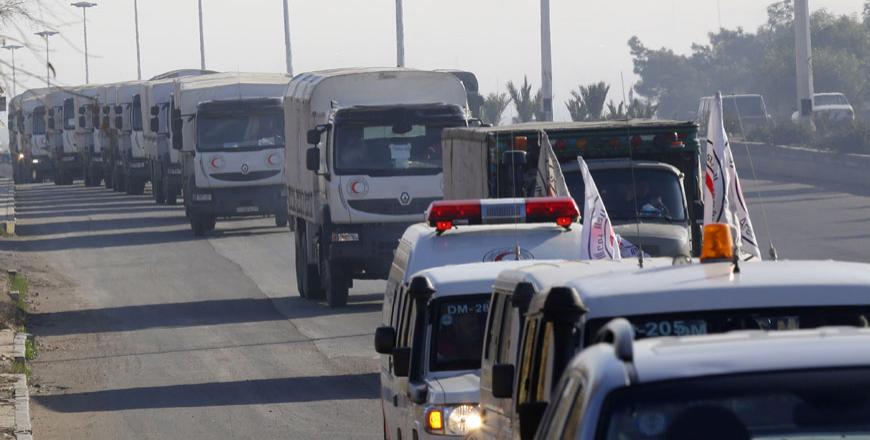You are here
Convoy reaches besieged, starving Syrian town
By Reuters - Jan 12,2016 - Last updated at Jan 12,2016

Aid vehicles wait on the outskirts of besieged rebel-held Syrian town of Madaya, on Monday (AFP photo)
MADAYA, Syria — An aid convoy entered a besieged Syrian town on Monday where thousands have been trapped without supplies for months and people are reported to have died of starvation.
Trucks carrying food and medical supplies reached Madaya near the Lebanese border, and began to distribute aid as part of an agreement between warring sides, the United Nations and the Red Cross said.
Dozens are said to have died from starvation or lack of medical care in the town and activists say some inhabitants have been reduced to eating leaves. Images said to be of emaciated residents have appeared widely on social media.
At the same time, another convoy began entering two Shiite villages, Al Foua and Kefraya in the northwestern province of Idlib 300km away. Rebel fighters in military fatigues and with scarves covering their faces inspected the aid vehicles in the rain before they entered.
Madaya is besieged by pro-Syrian government forces, while the two villages in Idlib province are encircled by rebels fighting the Syrian government.
Women cried out with relief as the first four trucks, carrying the banner of the Syria Red Crescent crossed into Madaya after sunset, with civilians waiting on the outskirts of the town as the temperature dropped and it began to get dark.
Offloading aid supplies were expected to last through the night, and the full aid operation several days, the International Committee of the Red Cross said.
Images said to be from Madaya and showing skeletal men with protruding ribcages were published by the Syrian Observatory for Human Rights, a group that monitors the war, while an emaciated baby in a nappy with bulging eyes was shown in other posts.
Madaya residents on the outskirts of the town said they wanted to leave. There was widespread hunger and prices of basic foods such as rice had soared, with some people living off water and salt, they said.
One opposition activist has said people were eating leaves and plants.
The blockade of Madaya has become a focal issue for Syrian opposition leaders, who told a UN envoy last week they would not take part in talks with the government, slated for later this month, until it and other sieges are lifted.
The United Nations said on Thursday the Syrian government had agreed to allow access to Madaya, where UN officials say there have been credible reports of people dying of starvation.
Dr Mohammed Yousef, who heads a local medical team in Madaya, said on Monday that 67 people had died either of starvation or lack of medical aid in the last two months, mostly women, children and the elderly.
The Madaya blockade began six months ago when the Syrian army and its Lebanese ally, Hizbollah, started a campaign to reestablish President Bashar Assad’s control over areas along the Syrian-Lebanese border.
Hizbollah responded to accusations it was starving people in Madaya by denying there had been any deaths in the town, and accusing rebel leaders of preventing people from leaving.
Blockades have been a common feature of the nearly five-year-old war that has killed 250,000 people. Government forces have besieged rebel-held areas near Damascus for several years and more recently rebel groups have blocked loyalist areas including Al Foua and Kefraya.
Aid agencies welcomed Monday’s deliveries but called for regular access to besieged areas.
“Only a complete end to the six-month old siege and guarantees for sustained aid deliveries alongside humanitarian services will alleviate the crisis in these areas,” a joint statement from several international agencies said.
The areas included in the latest agreement were all part of a local ceasefire deal agreed in September, but implementation has been difficult, with some fighting around Madaya despite the truce.
Each side is looking to exert pressure on the other by restricting entry of humanitarian aid, or evacuations, in their areas of control, the observatory says.
The last aid delivery to Madaya, which took place in October, was synchronised with a similar delivery to the two other villages.
Aid agencies have warned of widespread starvation in Madaya, where 40,000 people are at risk.
Hizbollah has said rebels in the town had taken control of aid which they were selling to those who could buy. The people of Madaya were being exploited in a propaganda campaign, it said.
Related Articles
BEIRUT — Trucks carrying humanitarian aid entered a besieged Damascus suburb on Wednesday in a major, UN-backed deal to deliver help to tens
NEAR MADAYA, Syria/BEIRUT/GENEVA — Aid supplies on Thursday reached a besieged Syrian town and two trapped villages for the second time this
BEIRUT — Aid groups were in talks Tuesday to evacuate 400 people, many starving, from a besieged Syrian town where the UN said suffering was

Opinion
Apr 09, 2025
Apr 08, 2025
- Popular
- Rated
- Commented
Apr 08, 2025
Apr 09, 2025
Newsletter
Get top stories and blog posts emailed to you each day.















